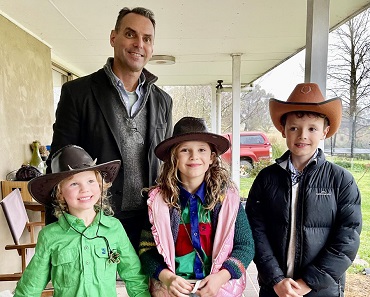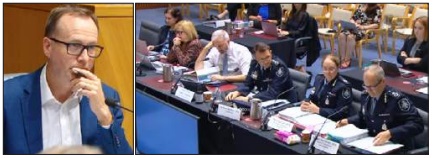Imprisoned Australian citizen Daniel Duggan is a former US Marine Corps pilot who was arrested by the Australian Federal Police (AFP) on 21 October 2022 at the behest of the US government. The United States alleges that between 2010 and 2012, Duggan illegally provided training to Chinese military pilots, a charge which Duggan emphatically denies. Duggan’s advocates assert that the US government’s charges against Duggan, which were “cobbled together” under the Trump Administration during the period that anti-China hostility escalated in Washington and Canberra, are politically motivated and a direct outcome of the USA’s geopolitical confrontation of China. Since his arrest eight months ago, Duggan has been imprisoned under extremely harsh conditions, including ongoing solitary confinement, in a maximum-security prison in New South Wales. AAS has previously charged that the Albanese government is torturing Daniel Duggan at Washington’s behest.
On 10 June 2023, Daniel Duggan’s wife Saffrine made a formal complaint to the NSW Ombudsman for Detention and Custody, Kate Smithers, regarding Duggan’s treatment: “Dan is currently imprisoned at the NSW maximum-security facility, Lithgow Correctional Centre despite no Australian charges, convictions or history of violence.” According to Saffrine, as of 8 June 2023, the father of six “has been incarcerated in maximum security isolation for 230 days awaiting extradition to the United States, based on 11-year-old, unproven allegations that he strenuously denies. … Dan’s 230-day stint in solitary confinement torpedoes the UN limit of 15 days. His incarceration breaches UN treaties that the Australian government has signed. … The UN’s 15-day threshold is not accidental: it is important because at about 15 days the impact of negative mental and physical health are likely to become permanent for most people.” Saffrine’s complaint included reference to a 28 February 2020 statement by Nils Melzer, then-UN Special Rapporteur on torture, which described the “severe and often irreparable psychological and physical consequences of solitary confinement”, a practice which is routinely used in US prisons. According to Melzer, “This deliberate infliction of severe mental pain or suffering may well amount to psychological torture”.
According to Saffrine, in prison Dan has been denied medical care, receives minimal food, and has only been provided with two thin, ripped cotton throw blankets despite the lack of adequate heating in his cell. Duggan’s lawyers and family have made a formal complaint to the United Nations Human Rights Committee, asserting that his ongoing harsh prison conditions violate the International Covenant on Civil and Political Rights (ICCPR). Duggan has only been allowed limited access to his lawyers, inhibiting his ability to prepare his defence. Duggan’s legal team informed the 12 February 2023 Sydney Morning Herald that a clinical psychologist who had examined Duggan described his prison conditions as “inhumane” and stated that they had had a “significant impact on his mental health”. Documents recently released under FOI reveal that in a 20 December 2022 letter to Attorney-General Mark Dreyfus, Duggan’s lawyers made a request under s.17(1)(a) of the Extradition Act 1988 that Dreyfus release Duggan from custody, citing the impact of Duggan’s prison conditions and a psychologist’s assessment of his condition. Dreyfus wrote to Duggan’s lawyers the following day to inform them that he had formally accepted the US government’s extradition request , which was made on 9 December 2022. Curiously, although Dreyfus listed previous letters from Duggan’s lawyers as taken into consideration when making his decision that Duggan’s remand should not cease, Dreyfus inexplicably left the 20 December letter out of the list.
UN torture-prevention delegation denied access to NSW prisons
On 23 October 2022, two days after Duggan’s arrest and subsequent incarceration in a NSW maximum security prison under “inhumane” conditions, the UN Subcommittee on Prevention of Torture (SPT) decided to suspend its tour of Australian detention facilities, because the obstructionism the Subcommittee encountered meant that the visit “had been compromised to such an extent that they had no other option but to suspend it”. According to a 23 October 2022 statement, the SPT delegation was “prevented from visiting several places where people are detained, experienced difficulties in carrying out a full visit at other locations, and was not given all the relevant information and documentation it had requested”. The only other country in which a SPT visit has been terminated due to such obstructionism is Rwanda.
The NSW government refused to allow the SPT to enter any correctional facilities within the state. As reported by the 23 October 2022 Guardian, then-NSW Corrections Minister Geoff Lee expressed extraordinary contempt for the UN delegation, stating: “The whole role of our jail system is to keep people safe, protect us from the criminals that we lock up every day … It’s not to allow people just to wander through at their leisure. [The UN] should be off to Iran looking for human rights violations there.”
Who ordered Duggan’s harsh prison treatment?
As reported by the 12 February 2023 SMH, the Attorney-General’s Department, the Australian Federal Police and the US Department of Justice have all refused to say who recommended Duggan’s classification as an “extreme high risk” prisoner, which is the basis for his extremely harsh prison conditions and ongoing solitary confinement. As reported by SMH, although NSW Corrective Services approved the classification, Duggan’s legal team maintains that this would likely have been on the recommendation of another agency. Duggan’s lawyer Dennis Miralis told SMH: “We have directly asked the Commissioner for Corrective Services to deny whether or not in fact there’s been any foreign interference in this decision-making”, presumably referring to the US government. Miralis stated: “We’re still fighting to get access to the underlying documents that went into the designation. We’ve been told that secrecy provisions will not allow us to get access to that material.” Although over sixty documents relevant to this matter have been located, the Australian government has refused access on national security grounds.
The US government requested Duggan’s provisional arrest on 19 December 2022, and the Attorney-General’s Department (AGD) obtained a warrant the same day. Duggan was arrested by the AFP two days later. The AGD’s official talking points in relation to the Duggan matter, recently released under FOI, reveal that if asked about Duggan’s prison conditions, AGD staff are instructed to respond: “Mr Duggan’s prison conditions are a matter for him to take up with NSW Correctional Services.”
In a 13 February 2023 Senate Estimates hearing, Greens Senator David Shoebridge questioned the AFP’s representative, Deputy Commissioner Ian McCartney, about Duggan’s prisoner classification. McCartney claimed to be unaware that Duggan had been categorised as an extreme high risk prisoner. Shoebridge asked whether the AFP had “at any point communicate[d] to New South Wales authorities or to the courts, but more particularly to Corrective Services New South Wales, anything about Mr Duggan being appropriately designated as an extreme high-risk inmate?” McCartney took this question on notice.
Senator Shoebridge also questioned the AFP as to whether it was aware “of any representations from the United States in relation to the detention conditions of Mr Duggan, including whether or not he should be designated extremely high risk or some similar category”, or if “any other entity has sought to have Mr Duggan designated as extremely high risk”. McCartney again took these questions on notice.
Because the AFP is part of the Attorney-General’s portfolio, a representative from the AGD, Sarah Chidgey, Deputy Secretary of the National Security and Criminal Justice Group, was interviewed at the 13 February Senate Estimates hearing alongside the AFP. Although documents recently released under FOI confirm that the AGD was well aware of Duggan’s “high risk” classification and of his legal team’s efforts to ascertain why he was so categorised, Chidgey was silent on the matter during Senate Estimates. During Shoebridge’s questioning of the AFP over the USA’s potential influence on Duggan’s prisoner classification, Chidgey jumped in, appearing to try to deflect Shoebridge’s queries, stating: “I might just add: it is Corrective Services New South Wales who determines those conditions. I don’t think it’s something we would be able to comment on, for privacy considerations and other reasons. It’s very much determined by New South Wales.”
Shoebridge rejoined: “The question is, Ms Chidgey, as you would have heard, whether or not any representations were made by the AFP or through the AFP on behalf of the United States government. I think the deputy commissioner has taken that on notice. Are you aware of any representations made by the United States government in relation to Mr Duggan’s detention conditions?” (Emphasis added)
Chidgey did not directly answer Shoebridge’s yes-or-no question. Instead, she deflected: “I’m aware that it’s determined by Corrective Services New South Wales in accordance with their arrangements that they would generally apply in New South Wales.”
Shoebridge replied, “You’re pushing against an open door. I know it’s determined by them but normally on the basis of representations made either by the New South Wales police or by the arresting police force. Given the rest was undertaken by the AFP, I’m asking the AFP. Do you understand that?” Chidgey responded simply, “Yes”.
The AFP’s answers to Shoebridge’s aforementioned questions on notice were a direct reflection of the AGD’s official talking points: “Decisions relating to inmate classification for individuals held in custody in NSW, including those in extradition custody, are a matter for NSW Corrective Services. It is not appropriate to provide any further commentary on this matter which is currently before a magistrate in Australia.”
AFP Deputy Commissioner Ian McCartney’s professed ignorance regarding Duggan’s high-risk prisoner classification, and AGD Deputy Secretary Sarah Chidgey’s apparent dissembling regarding this matter, raise questions. Is the Attorney-General’s Department aware that the US government has influenced the decision to categorise Duggan as an “extreme high risk” prisoner, or did the Department itself make this representation to NSW Corrective Services, at the behest of the United States? It must be asked if the Attorney-General’s Department, which is responsible for facilitating Duggan’s extradition proceedings, is also engaged in politicised persecution of Duggan, under the direction of Washington.
By Melissa Harrison, Australian Alert Service, 21 June 2023








